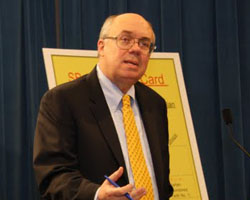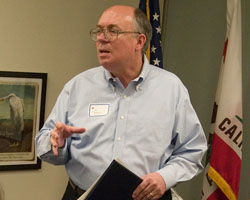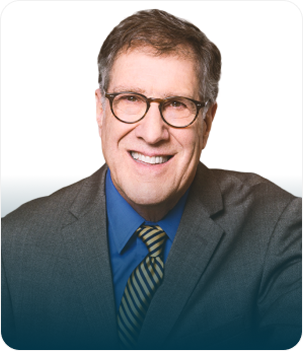For the past few weeks at GJEL blog, we’ve been focusing on distracted driving bans limping through state legislatures across the country. The movement is also picking up steam on the national level. The Department of Transportation has launched trial programs in New York and Connecticut to boost regulation, and congressional Democrats have promised to address a federal distracted driving law this year. But here in California, the debate is really heating up. Earlier this month, the state’s transportation and housing committee approved a bill sponsored by Palo Alto Democrat Joe Simitian which would increase distracted driving fines for drivers, and add new penalties for cyclists. Speaking to GJEL Blog, Sen. Simitian discussed the real-world dangers of distracted driving, opposition from cell phone companies, and his bill’s potential to save more than 700 people per year in California alone.
GJEL: You have a strong record on environmental issues, but that’s no longer what you are known for. Why did you decide to focus on reducing distracted driving?
Joe Simitian: When I introduced a hands free bill in my first year, I was probably naïve about my prospects. Verizon Wireless supported the bill from the very start. But every other cell phone company in the country opposed it. What was frustrating about the opposition was that every one of the companies already told consumers that they had to pull over to the side of the road to make calls or text. So the bill I introduced was seen as telling people to do the same thing they were supposed to do anyway. Finally in 2006 I was able to get both sides of the legislature to pass the bill and Governor Schwarzenegger signed it in to law. It took affect July 1, 2008.
This was really not what I thought I would be working on when I got the legislature, but the more I worked on the issue the more I realized it was a life saver and we weren’t going to miss the opportunity due to industry opposition.
 GJEL: The laws already in place have been pretty successful. Why increase the fines?
GJEL: The laws already in place have been pretty successful. Why increase the fines?
JS: There’s a base fine and then there are a series of fees and penalties that get added to it. The base fine has been $20 for a first offense, which is very modest. The bill I’ve introduced would increase this to $50 for first and $100 for a subsequent offense. The motivation is that we’ve had some time since the law took effect in July 2008 and the results we’ve seen are very encouraging. Fatalities are down 20%, which is 700 fewer fatalities each year in California alone. The results are encouraging.
We continue to hear from the folks at CHP that while the compliance is good, it could still be better. That’s not surprising to me. Enacting seat belt legislation, for example, took a long time. Now it’s routine that when you climb into the car, you buckle the belt. Over time, we’ve gotten 90% compliance on seat belts. It will take time, education, and enforcement. But we’ve raised the notion that if we had a higher fine, it would be a more significant deterrent and we could save even more lives. The bill also calls for a point on the driving record, because that gets everybody’s attention, and cuts across income levels. For folks that are more prosperous, they can shove a ticket off, but for people who are less prosperous, it can be a severe hit. A point on one’s license has the same impact across the board.
GJEL: Due to opposition from cell phone companies, it took nearly five years to pass the existing law. Will the increased fines face similar opposition?
JS: The cell phone companies’ position has evolved over time. For whatever reason, they have been largely neutral on heightened fees and I suspect that they will stay that way. The tougher challenge is the fact that the economy is bad, which gives all of us pause when it comes to increasing fines. But the $50 fine is relatively modest: half what you get if you litter while in your car, or use the carpool lane when you’re not supposed to. I hope the bill will pass this year, but due to term limits and retirements, there is a whole new crop of folks in the state senate to educate and persuade on an issue that won’t be all that familiar to some of my colleagues.
GJEL: How does adding the bike fines change the politics of the bill?
JS: That a bike fine wasn’t already included in the bill is the result of a drafting oversight in 2006. The vehicle code applies to both motorists and cyclists. The 2006 hands free law made reference to motor vehicles, which meant that the law did not apply to cyclists, and changed the way the motor code operated. The new bike fine is just a clean up, but it sparked more interest than I had expected. The cycling community is of mixed minds on this. Some don’t want cyclists to be fined, but a more serious faction says “look we want to share the road, and we should be seen equally under the law.”
 GJEL: The new bike fines show that cell phone fines are spreading. Could it eventually expand to cover texting while walking down the street?
GJEL: The new bike fines show that cell phone fines are spreading. Could it eventually expand to cover texting while walking down the street?
JS: I don’t think so. For me, it’s gratifying to see the broader public awareness and acknowledgement of safety risks with distracted driving and cell phones in particular. Last fall, the Obama administration and Secretary of Transportation Ray Lahood called a national distracted driving summit. And a year later, everyone from the Lahood to Oprah is focused on the risks of distracted driving. The Public Policy Institute of California took a look at driving laws in three other states and the District of Columbia just before our law went into affect. Their analysis was that hands free had reduced fatalities in every jurisdiction and time period studied. The folks at PPIC predicted that we would have 300 to 900 fewer fatalities each year as a result, and 700 is where we ended up.
GJEL: What do you think about a potential federal law against distracted driving? Is this a states’ rights issue?
JS: They’re looking mostly at texting. Things move slowly in congress, it is a much bigger battleship to turn in a new direction. I’m hopeful, but I will take the wait and see approach. It’s a tough call. On the one hand, as a state legislator, I’m mindful of our desire to craft legislation that fits California, and on the other hand, if the federal legislation is less rigorous than what we have in California and takes precedent, that would be a real concern.
Photo credit: Senator Simitian



 AI-search
AI-search  Email
Email